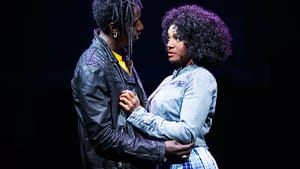Stay in the Loop
BSR publishes on a weekly schedule, with an email newsletter every Wednesday and Thursday morning. There’s no paywall, and subscribing is always free.
The mythologization of Tupac Shakur
'Holler If Ya Hear Me' on Broadway

Broadway is packed with an array of jukebox musicals this season. Now, along comes a new blast of sound in the form of a hip-hop/rap musical. Called Holler If Ya Hear Me, this fresh arrival promises to bring in a whole new energy for Broadway and a significant new audience — young, hip, African-American, and exuberant.
The show’s title comes from a 1993 song by the legendary Tupac Shakur, an iconic rapper who has become a folk hero of his generation. Born in East Harlem into a family of black activists (his parents were members the Black Panther Party in the '60s and '70s), Shakur became a performer, composer, and poet in his teens after the family moved to California. His rise in the hip-hop musical world was meteoric, featuring five record albums, two books of poetry, and roles in six films.
Along the way, he became embroiled in a widely publicized East Coast/West Coast rivalry between two hip-hop groups, involving the Notorious B.I.G’s Bad Boy Records and Shakur’s own Death Row Records. The feud grew violent (Shakur was imprisoned numerous times) and resulted in his untimely death at 25 in 1996 from a drive-by shooting in Las Vegas. (His rival was assassinated a year later.) To this date, both murder cases remain unsolved.
Immortal artist
Meanwhile, Shakur continues to garner posthumous accolades, including one from Rolling Stone magazine naming him among 100 Immortal Artists of All Time along with Elvis Presley, Michael Jackson, and John Lennon. He is credited with bringing gangsta rap into the mainstream of American music, and his songs about racism, social injustice, and the plight of young, poor, urban African Americans have ignited an entire generation.
Clearly, the life story of Tupac Shakur (or 2Pac, as he was called) is the kind of sensational tale that myths are made of. But rather than mythologize, author Todd Kreidler (an August Wilson collaborator) and Kenny Leon (director of the current production of A Raisin in the Sun) have chosen another way to honor Shakur’s life and work. Instead of telling an autobiographical story, they’ve created a fictionalized one inspired by his music and poetry and set it in the present in an unnamed industrial midwestern city.
The protagonist and embodiment of Shakur’s spirit, John (a charismatic Saul Williams), whom we first meet at the top of Act I as he’s being lowered from the stage ceiling into his jail cell. He’s being released from prison, returning home to his 'hood to start anew. He’s determined to live a clean life and reforge relationships with people from his past, including his friend Vertus, who is now dealing drugs (an engaging Christopher Jackson), Vertus’s mother (a formidable Tonya Pinkins), and his ex-girlfriend Corinne (a lively Saycon Sengbloh). But John gets dragged into gang warfare and suffers the inevitable consequences.
The intricate plot of the show is sometimes murky and difficult to follow, making me wish that the creators had told Shakur’s true story instead (never mind; a biopic is in the works). Nonetheless, the star of the show is Shakur’s music. His rap songs (there are over a dozen in the show) offer a powerful, enduring testimony to the hardship of inner city life in an era where young, disenfranchised blacks ended up in prison, where families and friendships were fractured, and violence ruled. The music and beat are hypnotic; the lyrics are provocative, profane, and profound. (“How long will it last 'til the po' getting mo' cash/Until then, raise up! / Tell my young black males, blaze up!” are some of the lyrics from the song that bears the show’s title).
Choreographed spontaneity
A talented, passionate ensemble of over two dozen young performers rap their hearts out as they move to the charismatic beat. Wayne Cilento’s creative choreography seems spontaneous and unrehearsed, as if it comes from the individual performers themselves. At moments, the stage is teeming with vibrant, chaotic life, just like the streets of inner-city America. The result is a compelling (if flawed) show that throbs with energy and glows with authenticity.
Holler joins the growing ranks of American musicals that poeticize life in the inner American city. The element of ghetto warfare immediately calls to mind the Jets and Sharks in Leonard Bernstein’s immortal West Side Story (1957). Holler’s sense of neighborhood evokes the lower East Side of Jonathan Larson’s Rent (1996) and the upper Manhattan of Lin-Manuel Miranda’s In The Heights (2008). The young rappers of Holler resonate with the same combustible energy as the young urban poets in Russell Simmons’s Def Poetry Jam (2002). And the dancing evokes the exuberance of George C. Wolfe’s Bring in 'da Noise, Bring in 'da Funk (1996).
The show’s ambitious collaborators, Kreidler and Leon, are dreaming big dreams. “I’m hoping it opens the doors for a lot of young writers, a lot of diverse writers….I think Broadway can embrace all of the voices,” Leon says in an interview with Newsday. The creators of Holler If Ya Hear Me can be rest assured that their show is being heard.
What, When, Where
Holler If Ya Hear Me, book by Todd Kreidler, lyrics by Tupac Shakur. Kenny Leon directed. At the Palace Theatre, 1564 Broadway at 47th Street, New York. http://www.broadway.com/shows/holler-if-you-hear-me/
Sign up for our newsletter
All of the week's new articles, all in one place. Sign up for the free weekly BSR newsletters, and don't miss a conversation.